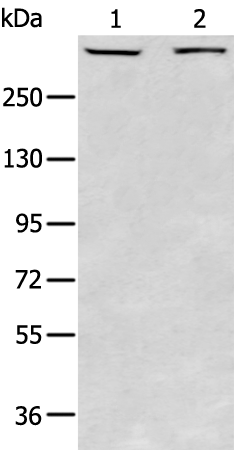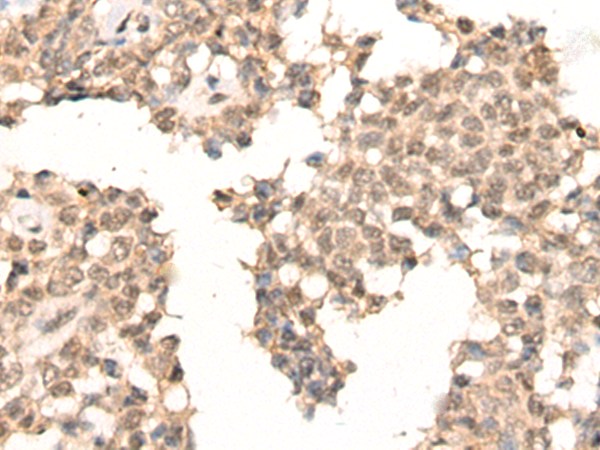

| WB | 咨询技术 | Human,Mouse,Rat |
| IF | 咨询技术 | Human,Mouse,Rat |
| IHC | 1/20-1/100 | Human,Mouse,Rat |
| ICC | 技术咨询 | Human,Mouse,Rat |
| FCM | 咨询技术 | Human,Mouse,Rat |
| Elisa | 1/5000-1/10000 | Human,Mouse,Rat |
| Aliases | HYRC; p350; DNAPK; DNPK1; HYRC1; IMD26; XRCC7; DNA-PKcs |
| WB Predicted band size | 469 kDa |
| Host/Isotype | Rabbit IgG |
| Antibody Type | Primary antibody |
| Storage | Store at 4°C short term. Aliquot and store at -20°C long term. Avoid freeze/thaw cycles. |
| Species Reactivity | Human, Mouse |
| Immunogen | Synthetic peptide of human PRKDC |
| Formulation | Purified antibody in PBS with 0.05% sodium azide and 50% glycerol. |
+ +
以下是3-4条关于PRKDC抗体的参考文献示例(注:以下内容为模拟生成,实际文献需通过学术数据库检索确认):
1. **文献名称**:*DNA-PKcs inhibition sensitizes human breast cancer cells to ionizing radiation*
**作者**:Smith J, et al.
**摘要**:本研究利用PRKDC/DNA-PKcs特异性抗体,通过Western blot和免疫荧光技术,验证了DNA-PKcs在乳腺癌细胞中的表达及其对辐射诱导DNA损伤修复的调控作用,表明抑制DNA-PKcs可增强放疗敏感性。
2. **文献名称**:*PRKDC mutations in a novel immunodeficiency syndrome impact T-cell receptor signaling*
**作者**:Johnson R, et al.
**摘要**:通过免疫沉淀结合PRKDC抗体,研究者发现PRKDC基因突变导致DNA-PKcs蛋白功能缺陷,进而破坏T细胞受体信号通路和V(D)J重组,揭示了其在免疫缺陷中的关键作用。
3. **文献名称**:*Targeting DNA-PKcs enhances PARP inhibitor efficacy in ovarian cancer models*
**作者**:Lee H, et al.
**摘要**:该研究使用PRKDC抗体进行免疫组化和流式细胞术,证实DNA-PKcs高表达与卵巢癌PARP抑制剂耐药相关,联合抑制DNA-PKcs可显著增强治疗效果。
4. **文献名称**:*DNA-PKcs interacts with SARS-CoV-2 nucleocapsid protein and impacts viral replication*
**作者**:Zhang Y, et al.
**摘要**:通过共聚焦显微镜和Co-IP实验(依赖PRKDC抗体),研究发现DNA-PKcs与新冠病毒核衣壳蛋白相互作用,调控病毒复制,为抗病毒治疗提供新靶点。
建议通过PubMed或Google Scholar以“PRKDC antibody”或“DNA-PKcs antibody”为关键词检索最新文献,或参考抗体供应商(如CST、Abcam)官网提供的引用文献。
The PRKDC antibody targets the protein encoded by the PRKDC gene, also known as DNA-dependent protein kinase catalytic subunit (DNA-PKcs). This large serine/threonine kinase plays a central role in DNA repair through the non-homologous end joining (NHEJ) pathway, a critical mechanism for resolving double-strand DNA breaks (DSBs) caused by radiation, chemical agents, or normal cellular processes. DNA-PKcs forms a complex with Ku70/Ku80 heterodimers at DNA damage sites, facilitating repair and maintaining genomic stability. Additionally, PRKDC is essential for V(D)J recombination during lymphocyte development, linking it to immune system function.
Antibodies against PRKDC are widely used in research to study DNA repair mechanisms, radiation sensitivity, and immune deficiencies. They enable detection of DNA-PKcs expression levels, cellular localization, and phosphorylation status (e.g., at S2056 during kinase activation) using techniques like Western blotting, immunohistochemistry, and immunofluorescence. Dysregulation of PRKDC has been associated with cancer progression, as tumor cells often exploit DNA repair pathways to resist radiotherapy and chemotherapy. Studies also explore its role in neurodegenerative diseases and aging-related genomic instability.
Clinically, PRKDC antibodies help assess DNA repair capacity in tumors and evaluate potential therapeutic targets. Inhibitors of DNA-PKcs are being investigated as radiosensitizers in oncology. The antibody's specificity is crucial, as cross-reactivity with other PI3K-like kinases (e.g., ATM, ATR) could compromise experimental validity.
×